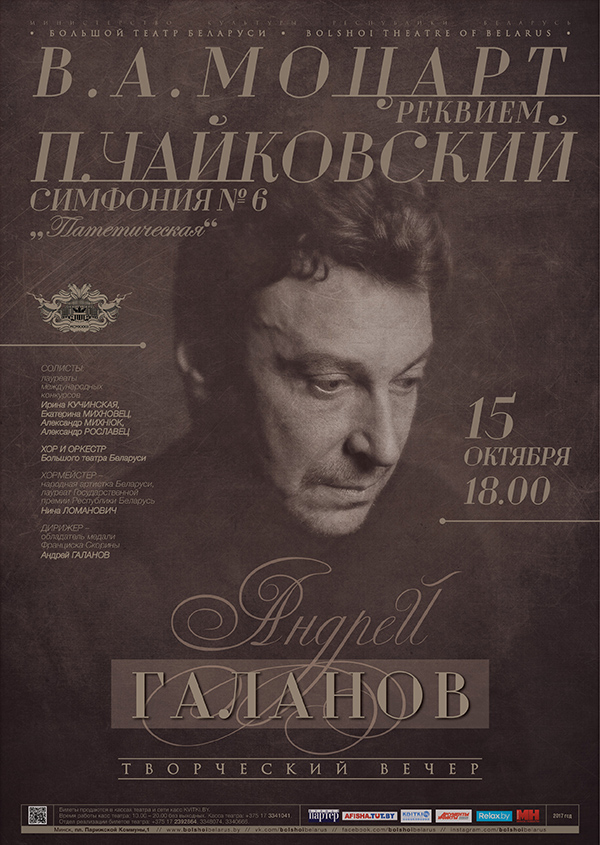 Bolshoi Theatre of Belarus
Bolshoi Theatre of Belarus
Bolshoi Theatre of Belarus
Bolshoi Theatre of Belarus
 Bolshoi Theatre of Belarus
Bolshoi Theatre of Belarus
Bolshoi Theatre of Belarus
Bolshoi Theatre of Belarus
Conductor Andrei Galanov invites the audience to an evening on the occasion of his jubilee on 15 October.
Conductor Andrey Galanov invites the audience to the Bolshoi on the day of his jubilee. On 15 October the maestro turns 50. All this day Andrei Galanov will spend in the theatre. He will prepare, rehearse, he will be excited to meet the audience at his evening. Of course, he will conduct!
ŌĆśOn this day I want to make a real holiday for the audience, a festival of music. Yes, it could be a concert kaleidoscope of popular melodies, but I do not really like this idea,ŌĆÖ Andrei Galanov admitted. ŌĆśSo I decided to take serious and large-scale works - Requiem by Wolfgang Amadeus Mozart and Symphony No.6 by Pyotr Tchaikovsky. Yes, these are minor-key works, but they are my favorite ones, that's why they will be performed... Each musician has his own psychophysics. Naturally, IŌĆÖm no stranger to fun and cheerfulness, but very often I focus on music in minor key. It is very important to me, I have a deep understanding of it ... But it is very important for a musician to feel the music, to plunge into it completely. Then the touch to the music will be completely different. And it will cause different emotions...
Requiem: ŌĆś... The Quintessence of Beauty ...ŌĆÖ
During the first part of the evening, the Solemn Mass, by Wolfgang Amadeus Mozart, will be performed. Many musicians consider it to be one of the most beautiful music compositions in the world.
In the first section of the celebratory evening Solemn Mass by Wolfgang Amadeus Mozart will be performed. Many musicians believe this is one of the most beautiful compositions in the world. And the audience has always shared this view...
There are a lot of mysterious facts behind the story of the Requiem creation. In summer 1791 a stranger ordered Mozart to compose a funeral mass, for an impressive amount of money. (Historians claim, ŌĆśthe black man, with his face shadowedŌĆÖ was the manager of an earl, the admirer of music, who often claimed pieces ordered from different composers as his own works). Wolfgang Amadeus started his work. It is interesting that in parallel with that, he was creating his own musical piece, Die Zauberfl├Čte, the premiere of which turned to be a failure, as often happens in the world history of music. And although Schikaneder (Mozart wrote Die Zauberfl├Čte for him) reached the hearts of the Viennese people later, the audience liked this opera, the composer himself very painfully suffered from this failure, which he was absolutely not ready for, and seriously fell ill. Despite the fact that the condition of Wolfgang Amadeus worsened, he became completely absorbed in the writing of Requiem - with all the passion of his nature. And the frequent visits of the customer only aggravated the situation: Mozart saw him as a black messenger of Death itself. No wonder he thought of his last composition as a funeral mass for himself.
ŌĆś... I must obediently bow to the will of Providence. So, I end my funeral song. I have no right to leave it unfinished ...,ŌĆÖ he wrote in autumn 1791. But the disease did not leave the composer, he was dying a quick death. And still, even without getting out of bed, he worked on his Requiem. These days, friends did not leave him, helping him everything they could. Among them was a student of Mozart, S├╝ssmayr. The deadly sick composer gave him the instructions how to complete the work on the mass. On 5 December 1791 the genius died. He was 35 years old ŌĆ”
Symphony No.6: ŌĆś... The Best and the Most Insightful ...ŌĆÖ
In the second part of the GalanovŌĆÖs evening the audience of the Bolshoi Theatre will hear the last symphony of Pyotr Tchaikovsky, mournful and simultaneously sublime. And this is hardly a coincidence ...ŌĆśThanks to him, I learned what music is,ŌĆÖ wrote Pyotr Tchaikovsky in his diaries about Mozart. ŌĆśIn my deep conviction, Mozart is the highest, the culmination point, which beauty has ever reached in the field of music. No one made me cry and thrill with delight┬Ā from the realization of my closeness to something that we call an ideal, as he is ... In Mozart, I love everything, because we love everything in the person who we really love ...ŌĆÖ
It seems that the Austrian geniusŌĆÖ music filled the life of Pyotr Tchaikovsky. It is not surprising that the idea to create his last symphony, Symphony No.6, came to the Russian composer during his visit to the MozartŌĆÖs birthplace, Salzburg. Tchaikovsky conceived it as the one close to the mood of his idolŌĆÖs Requiem. Having completed the work Tchaikovsky wrote: ŌĆśIn this Symphony I put, without exaggeration, my whole soul.ŌĆÖ The composer called it ŌĆśthe best and the most insightfulŌĆÖ of his works. On 16 October 1893 Tchaikovsky conducted the Symphony No.6 in┬Ā┬Ā┬Ā St. Petersburg, opening the new season of the Russian Musical Society. But, as so often in history, the critics did not appreciate the creation of the composer and the audience frankly did not understand it. It caused great distress to Tchaikovsky who considered the Sixth Symphony to be one of his main works. After a few days he was goneŌĆ” For the second time, Symphony No.6 was played at the concert in his memory and had a tremendous success. Now it is in the repertoire of almost all outstanding conductors.
Andrei Galanov is the recipient of the Francysk Skaryna Medal, graduate of the Belarusian State Academy of Music with Master of Arts in symphonic and opera conducting. His conducting career began in 1993 at the Bolshoi Theatre of the Republic of Belarus and from 2004 to 2006 he was the principal conductor. From the seasons of 1999-2003, he was the principal conductor of Rostov State Musical Theatre (Russia). And in 1997 he became a conductor of the State Academic Symphony Orchestra of the Republic of Belarus.
During his tenure at the theatre Andrei Galanov has staged such operas as Carmen by Georges Bizet, La cambiale di matrimonio by Gioachino Rossini, Iolanta and The Queen of Spades by Pyotr Tchaikovsky.
The conductor's repertoire comprises more than 20 opera and ballet productions, including Rigoletto by Giuseppe Verdi, Madame Butterfly and Tosca by Giacomo Puccini, Iolanta and The Queen of Spades by Pyotr Tchaikovsky, Lady Macbeth of the Mtsensk┬Ā District by Dmitri Shostakovich, The LadyŌĆÖs Visit by Sergey Kortes, The Firebird and┬Ā The Rite of Spring by Igor Stravinsky, Romeo and Juliet by Sergey Prokofiev, etc.
Andrei Galanov actively cooperates with Belarusian and foreign orchestras of Brazil, France, Italy, and Japan. He has toured worldwide, from Ireland to Japan, from Norway to Brazil, from Switzerland to Thailand.
Andrei Galanov is the laureate of the National Prize ŌĆ£For Spiritual RevivalŌĆØ and in 2000 in Russia he became the "Man of the Year 2000ŌĆØ in the nomination ŌĆ£Theatrical FigureŌĆØ.
┬Ā
┬Ā
